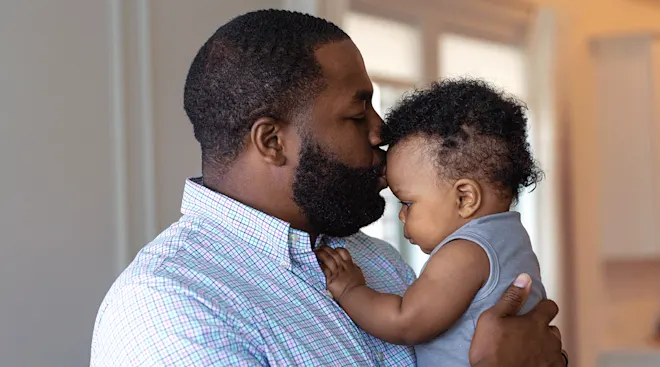8 Ways to Keep the Spark Alive in Your Relationship After Baby
Before parenthood, your relationship with your partner probably looked somewhat different. You were likely used to having sex whenever and however you wanted, and found plenty of opportunities to spend time together outside of the bedroom too. But since baby’s big arrival, your schedule has changed a little, to say the least, and sex may have dropped a few notches on the priority list. Let’s be honest: What used to be passionate lovemaking sessions have now turned into five-minute quickies while baby naps in their crib, right? Trust us, you’re not alone!
As a new parent, you shouldn’t strive to meet some “norm,” especially when it comes to sex. “When a new parent—or anyone, really—feels like they have to meet a certain sex ‘goal’, and they don’t, they feel like a failure,” says Emma K. Viglucci, LMFT, a licensed marriage and family therapist and founder of MetroRelationship.com. “You don’t want to strive to meet a certain norm, because that doesn’t exist.”
While it’s important to take your time as you find your parenting groove, there are still ways to find intimacy and feel connected with your partner after baby’s arrival. Below, some tips on how to bring the passion back post-baby, straight from the experts.
To maintain intimacy after baby, it’s important to shed the parental titles—and obligations!—and spend some time together as a couple. Have a babysitter, grandparent or someone else you trust watch baby for an hour, an afternoon or a night. Use this time to revisit the things you loved to do before you had a baby.
The goal here isn’t to forget baby, but to remember why you became a couple in the first place, explains Justin Kelly McClure, founder of OnlineDatingCritic.net and author of Pray Your Kids Are Ugly: Thoughts on Online Dating and the Future of Human Interactions. “When you have a child, you should look at your partner and remember why you’re attracted to them,” he says, adding that the attraction shouldn’t change now that you’re both parents. Text each other jokes and remind each other of your physical desire. McClure says that dropping a quick note (and we don’t mean the “hey can you pick up extra formula” kind) is a simple way to keep the excitement alive.
“Sex shouldn’t be the only way to keep your relationship healthy and strong,” he adds. (But it can help!) The key, he says, is to “keep in mind the things that you both loved to do before you were parents,” whether that’s unwinding with a favorite TV show or cooking up a storm together.
It’s normal to be scared of postpartum sex. After all, the parts involved just went through a pretty traumatic event. If you aren’t quite ready for actual intercourse but you still want to get intimate, there are other things you can do. “Intimate contact can come in many forms. Think in terms of sensual contact, sensual relaxation and sex play,” says Lisa Terrell, MA, DHS, sex therapist and founder of the Sensovi Institute in Charlotte, North Carolina. She recommends a joint shower, a game of strip poker, a candlelit tub or some skin-on-skin spooning. “Do things you both genuinely enjoy that have some kind of physical component rather than being intercourse- and orgasm-focused,” Terrell advises. Jolene H. says she and her partner would “call a babysitter and go to a movie. We would make-out like teens. It was hilarious! We even got caught once.”
You’re a parent now! You’ve mastered the art of holding baby while prepping family meals, and rocking baby’s bassinet while paying your bills. You can totally handle all the curves parenthood might throw at your relationship—and don’t be afraid to think outside the box. “My husband and I used to have sex in the closet at our house,” says Emma B. “Don’t ask me why, but that’s just where we would go when the baby was sleeping. We felt like it was the one room in the house that wasn’t littered with toys and receiving blankets. It wasn’t very big, and we usually just used the room for quickies, but that was our kid-free space.”
We promise your sex life won’t be all quickies from now on, but why not give them a shot during the crazy days of exhaustion, crying fits and 3 a.m. feedings? It worked for Kimberly Ford, author of Hump: True Tales of Sex After Kids, who claims that even brief intimate episodes released frustration, left her feeling closer to her husband and paved the way to a better sex life. (Remember to use protection during sex if necessary—it’s very possible to get pregnant again right away.)
It’s not just the new responsibilities and exhaustion—delivering a baby can leave you sore, dry and feeling less-than-lubricated. First, recognize that this has nothing to do with your love or desire for your partner. It’s those pesky hormones again—namely a decrease in estrogen due to your new placenta-free state. (Chemicals produced in breastfeeding can add to this issue too). Even after you’re cleared for sex by your ob-gyn, it could be months until you feel back to normal. Check out the personal care items at your local drugstore—a little well-placed lube can work wonders.
Plus, remember that your body is doing amazing things to care for baby after birth—and these changes may even present themselves in the bedroom. For example, if you’re breastfeeding, you might squirt milk when you orgasm. If it doesn’t bother you, then just go with it. If it does, try having sex right after a feeding or stick a couple of nursing pads into your bra for protection.
While it’s okay to not have as much sex as you used to, McClure says new parents shouldn’t start leaning on baby as a reason to dismiss sex altogether. “Just because you’re not having as much sex as maybe you’d like to doesn’t mean you’re a failure,” he says. The exciting (and important) part is that you both try to have that passion with each other—even if baby does start screaming halfway through.
Another thing to stay away from? Making it all about the kids. Having a child is a huge responsibility, but it doesn’t mean that’s the only thing that’s left. McClure says it’s important to ask yourself why you had a child in the first place: To create a family with someone you already loved and were attracted to.
Taking care of your physical and mental needs plays a huge role in intimacy and your bedroom desires. “You need to replenish yourself and be responsible for your basic needs, because that’s what’s going to help get you through the day,” says Viglucci. Yes, easier said than done, but she adds that this could be something as basic as staying hydrated (which is especially key for nursing moms) or taking a few minutes to get outside each day. “As a new parent, you need to be mindful about what basics you need to have met in order to feel good about yourself,” she says. Similarly, if your partner likes to de-stress for 30 minutes in the tub, let them. It’s important to keep the things that make you feel like you in the picture.
A big part of taking care of yourself? Communicating your necessities. Whether it’s an extra 15 minutes in the bathroom in the morning or a friends’ night once a week, you shouldn’t be timid when it comes to voicing the things you need. Being honest about what you want clues your partner into just how important your needs are.
“Getting what you want can’t happen if you’re stuck in your own head. That’s what gives way to insecurities,” McClure says. “Voicing your frustrations and letting your partner know what you’re missing or what you need is the best place to start communicating.” If you need sex to be quick tonight (or want to skip it altogether), don’t be afraid to say so. If you need to cry at the end of the day, do it. If your partner isn’t pulling their weight when it comes to the dishes, tell them—the longer you sit on that anger, the bigger your resentment gets. Being a new parent comes with a ton of baggage nobody preps you for, so take it as it comes. Just be mindful of how you communicate in times of frustration.
A great way to set up a system of communication is with weekly check-ins—and this doesn’t have to be during date night. Find a time every week where you and your partner can sit down and talk without baby present. Use this time to ask questions like, “How are you doing? How are we doing? What are you looking forward to most this week? What are you not looking forward to this week?” says Ana Hernandez, LMFT, a family therapist and teacher with the Ackerman Institute for the Family in New York City.
“When couples become new parents, their main identity is to be parents to their newborn, and that gets the most energy and focus,” she explains. “Due to this, the couple’s relationship gets put on the back burner.”
Not only will weekly check-ins allow space for you both to work through any issues, but it also helps you both get into the rhythm of making sure you’re on the same page. Outside of the check-ins, try to praise and encourage each other every day. “This fosters teamwork and unity, and allows for each member of the couple to feel seen by their partner,” Hernandez says.
Baby’s arrival can certainly change the dynamic at home. It can take some time to adjust, not only to your new parenting role, but also to the impact that baby’s arrival has had on your relationship. While the steps to maintaining intimacy inside and outside of the bedroom will look different for each couple, the most important thing is to give yourself—and your partner—some grace as you both figure out life with baby.
About the experts:
Emma K. Viglucci, LMFT, is a licensed marriage and family therapist and the founder of MetroRelationship.com. With over 20 years of experience, Viglucci provides partners with the tools to strong couples and create enriching homes for their children. She has a Bachelor of Science degree in psychology and human development from the State University of New York at Stony Brook, as well as a Masters degree in marriage and family therapy from Hofstra University.
Justin Kelly McClure is the author of Pray Your Kids Are Ugly: Thoughts on Online Dating and the Future of Human Interactions and founder of the blog Online Dating Critic.
Ana Hernandez, LMFT, is a licensed marriage and family therapist and the owner of Valiente Relational Healing in Boston, Massachusetts. She is also a member of the teaching faculty at the Ackerman Institute for the Family in New York City.
Lisa Terrell, MA, DHS, LCMHC, is a licensed sex therapist, author and founder of the Sensovi Institute in Charlotte, North Carolina. She completed her master’s degree in community counseling from Andrews University and has a doctorate of human sexuality from the Institute for Advanced Study of Human Sexuality.
Plus, More from The Bump:
Navigate forward to interact with the calendar and select a date. Press the question mark key to get the keyboard shortcuts for changing dates.




















































